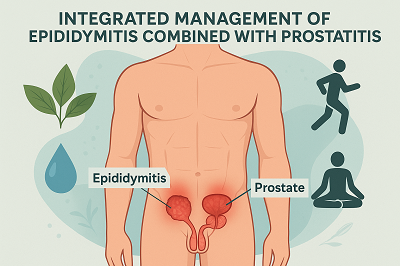Integrated Management of Epididymitis Combined with Prostatitis: Natural and Holistic Strategies
When epididymitis and prostatitis occur together, they can lead to more complex and persistent symptoms, including scrotal discomfort, perineal pain, frequent urination, and sexual dysfunction. While antibiotics may offer temporary relief, many men experience recurrent inflammation, especially when treatment focuses only on symptom suppression rather than root causes.
In this article, we'll explore a comprehensive approach to managing epididymitis combined with prostatitis, emphasizing holistic care, lifestyle changes, and effective natural remedies that support long-term recovery.

Understand the Connection Between Epididymitis and Prostatitis
Both conditions are characterized by inflammation within the male reproductive tract. The epididymis, located behind the testicle, plays a key role in sperm maturation. The prostate gland, meanwhile, supports semen production and urinary health. Infections or chronic inflammation in one organ can easily spread to the other through shared ducts, leading to complex symptoms and prolonged healing.
Common causes of co-occurring epididymitis and prostatitis include:
- Bacterial infections (e.g., E. coli, Chlamydia)
- Poor hygiene or unprotected sexual activity
- Prolonged sitting, sedentary lifestyle
- Pelvic congestion or blood stasis
- Autoimmune responses or chronic inflammation
Why Conventional Treatments Often Fall Short
Antibiotics are typically the first line of treatment. However, when inflammation becomes chronic or non-bacterial in origin, antibiotics may be ineffective or lead to resistance. Painkillers and anti-inflammatories offer symptomatic relief, but they don't address:
- Pelvic blood circulation issues
- Tissue fibrosis
- Reproductive function impairment
- Psychological stress and sexual performance anxiety
That's why an integrative and multi-dimensional approach is essential.
A Holistic Protocol: Lifestyle, Diet, and Herbal Therapy
1. Warm Compresses and Sitz Baths
Daily warm compresses or herbal sitz baths can relieve testicular and pelvic discomfort by improving blood flow and reducing congestion. Use for 15–20 minutes at bedtime.
2. Physical Activity & Pelvic Exercises
Light jogging, yoga, or pelvic floor exercises (e.g., Kegels) can promote circulation and reduce stagnation in the prostate and epididymis. Avoid prolonged sitting.
3. Anti-inflammatory Diet
Adopt a diet that supports healing and reduces inflammation:
- Increase: fresh vegetables, berries, whole grains, pumpkin seeds, and omega-3-rich foods (like salmon or flaxseed).
- Avoid: spicy foods, alcohol, caffeine, red meat, and high-sugar snacks.
4. Psychological Support
Chronic reproductive disorders can impact mental health. Practice stress reduction through mindfulness, meditation, or therapy. A calm mind supports hormonal balance and faster recovery.
Traditional Chinese Medicine (TCM): Natural Healing from Within
One of the most effective ways to manage epididymitis combined with prostatitis is through traditional Chinese medicine, which focuses on restoring internal balance, clearing damp-heat, and promoting blood circulation.
The Diuretic and Anti-inflammatory Pill, a proven herbal remedy rooted in TCM principles, has helped thousands of men recover from chronic reproductive inflammation. Its unique formula works to:
- Eliminate pathogens and toxins from the urogenital tract
- Relieve swelling, pain, and urinary discomfort
- Dissolve inflammatory nodules and prevent fibrosis
- Improve semen quality and reproductive function
Unlike conventional antibiotics, this herbal formula targets both the symptoms and root causes without damaging gut flora or liver function.
Clinical feedback shows that combining the Diuretic and Anti-inflammatory Pill with lifestyle adjustments significantly reduces recurrence rates in patients with chronic epididymitis and prostatitis.
Long-Term Prevention: Build a Healthier Routine
- Hydration: Drink at least 2 liters of water daily to support urinary tract flushing
- Ejaculation frequency: Avoid excessive or prolonged sexual abstinence
- Hygiene: Practice safe sex and proper genital hygiene
- Routine checkups: Monitor PSA levels, testicular health, and urinary function
- Sleep: Aim for 7–8 hours of restful sleep every night to support immune function
Final Thoughts
Managing combined epididymitis and prostatitis requires more than a quick fix—it demands a strategic, body-wide approach. By combining dietary changes, physical activity, stress management, and targeted herbal support, such as the Diuretic and Anti-inflammatory Pill, men can not only alleviate their symptoms but also establish long-lasting health and vitality.
If you're struggling with persistent symptoms, don’t rely solely on antibiotics or painkillers. Embrace a holistic approach and provide your body with the tools it needs to heal naturally, effectively, and safely.
Ready to take control of your health? Learn more about the Diuretic and Anti-inflammatory Pill and how it's helping men around the world reclaim their wellness.
👉 Click here to explore the product



